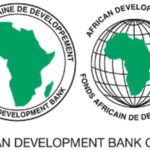In a bid to ease the challenges Nigerians exporters face in sending their goods out of the country, The Nigeria export promotion (NEPC) has disclosed plans to establish a domestic Export Warehouse (DEW) in inland dry ports.
The Executive Secretary of NEPC DR. Ezra Yakusak during a roundtable discussion organized by the Abuja Chamber of Commerce and Industry (ACCI), stated that the scheme would help solve storage and supply chain challenges and would reduce the heavy gridlock at the Apapa port.
- Nigeria’s data security ‘compromised’ as NIMC’s portal remains comatose
- Nigerian tweeps react as singer Oxlade’s sex tape surfaces online
Yakusak, while identifying port congestion, contract problems and export documentation as bane of exportation of Nigerian goods to the international market, stated that the intervention is to help the sector and increase forex generation for the government to strengthen the naira.
Represented by Assistant Director, Product Development Department, Afolabi Bello, he said the warehouse would contain storage facilities for agricultural products for export, custom clearance agents, NAFDAC personnel among others to reduce the number of days export products spend in Nigeria’s sea ports which has led to “Nigerian goods not exportable.”
“When the products go through this process, there won’t be any need to subject them to other forms of clearance at the seaports. This will also help to reduce the money exporters have to pay to get their products as the trucks conveying the goods will have a special logo to avoid police clearance on the way.”
He said nine operators of the scheme have been identified for the pilot stage with five given full approval while four are on provisional approval when gaps identified in their facilities are fixed.
He added that the project would also spur job creation with ancillary services needed at the ports.
Speaking, the General Managing of Kaduna Dry Port, Rotimi Raimi, stated that the scheme would help connect farmers and international buyers easily with the ports serving as intermediaries.
The Executive Director of ACCI’s Policy Advocacy Centre, Olawale Rsheed, said the event was organised to resolve the crises in the exportation value chain with a resultant effect of easing the burden and gridlock across the value chain.

 Join Daily Trust WhatsApp Community For Quick Access To News and Happenings Around You.
Join Daily Trust WhatsApp Community For Quick Access To News and Happenings Around You.


